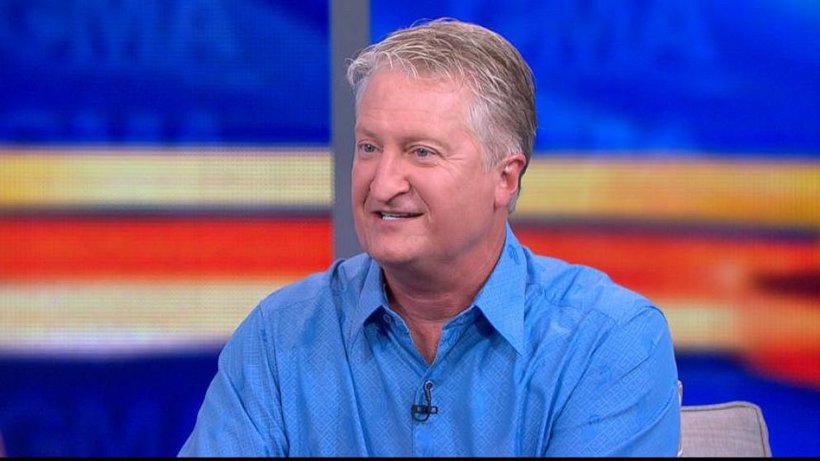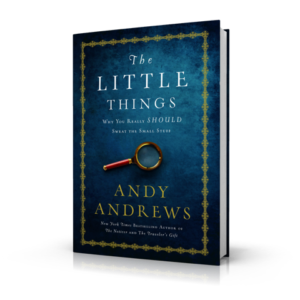
This week marks the release of my first book in four years—The Little Things: Why You Really Should Sweat The Small Stuff.
It is a straightforward, honest assessment of the thinking behind some of today’s most incredible successes. At least the ones in which I can say I have quietly played a small part. Honestly, I wrote this particular book because I am an old dad (57) with young sons (14 and 17). It was about eighteen months ago when I had this thought: If I die today, my sons will never know how these results occurred. If I don’t document this stuff now, they might never be able to harness the power of these principles in their own lives.
During the past few years, some of my clients—corporations, coaches, teams, families, and organizations—have achieved eye-popping results. Financial numbers more than doubled in a year. Winning percentages increased dramatically. Long-standing relationship rifts healed completely.
When I am asked how it has happened so consistently, I often answer, “The secret is in focusing on the little picture.”
The look on a person’s face after processing my reply is usually priceless. It is true, however, that nothing excites me more than a focused search for little things. Little things make big differences. After all, only the smallest essence of a thing can ever reveal its purity and, consequently, the source of its power.

Remember this phrase: “Don’t sweat the small stuff”? You’ve heard it thousands of times and honestly, on the surface, the admonition appears to be entirely logical. Without thinking too deeply about this seemingly innocent saying, we have bought into its meaning wholeheartedly. In fact, our belief in the truth of this statement is so complete that it can now be found by searching the Internet for words like wisdom or proverbs. Millions of us even bought a book with those words as its title.
Unfortunately, as good as it sounds and as tempting as it may be to follow that instruction, there is a big problem with not sweating the small stuff. Simply said, it’s a decidedly unproductive approach to virtually everything in your life you consider important!
If you really expect the results of your life to be any better than the rest of humanity’s average, you’d be smart to understand that sometimes… conventional wisdom is not even the truth.
Or in other words, it’s time to sweat the small stuff.
There are those who claim to be big-picture people. While their descriptions of future results are often grandiose and exciting, sometimes we elevate these people into leadership positions too quickly. For despite their big dreams, they may have no concept of all the little things that must be factored in, delegated, worked out, and completed in order for the big picture to actually come together.
Yes, it is critical to have a vision. But it is foolish to ignore the fact that every big picture ever completed was created by tiny, almost indiscernible movements of a brush and hand.
One of the greatest “big pictures” in history hangs in the Louvre. When Leonardo da Vinci painted the Mona Lisa, he chose to work with the smallest brush he had ever used. The pressure he applied with that brush was so delicate and the movements of its tip so slight that today, even with a magnifying glass, one cannot discern the individual brushstrokes. Yet they were obviously applied one at a time, carefully and with loving attention. Why? Because da Vinci was creating a masterpiece.
Most of us know there is strength and opportunity available in larger numbers. Some even understand the potential in “one.” For a moment, consider not just the power of one, but the power of a fraction of one. When one contemplates financial reward or future opportunities, is there a significant gap in those items between first and second place? Of course there is. But how much of a gap?
The financial difference in the opportunities offered to a gold medalist versus a silver medalist is hard to quantify considering the variety of Olympic sports that are contested. But it is clear that Michael Phelps has more of life’s opportunities, personally and in business, because he won gold medals than if he had “only” won silver.
Decades after winning gold medals, athletes like Mary Lou Retton, Sugar Ray Leonard, Carl Lewis, Peggy Fleming, and Mike Eruzione are all remembered and revered. They also continue to be well compensated. In fact, many gold medalists are paid tens of thousands of dollars merely to stand in front of a group of people and recount their athletic experiences. The silver medalists…not so often.
Okay, you say. This is all very obvious. What’s the point?
Well, the point is very simple, but for some reason it is often missed in our almost constant struggle to understand that ever popular big picture. You see, the point of demonstrating the chasm between first and second place is not to illustrate the financial difference. Or even to show the financial reward produced over time by lasting fame.
No, if you and I are to become extraordinary achievers, we must learn to recognize the little things that actually create the gap—and consequently the difference in opportunities—between one and two. Astonishingly, these little things that most people see as irrelevant sometimes occur days or even weeks in advance of the event.
And know this: the difference really is in little things, because the actual gap between first and second place is most often ridiculously small. In fact, there are multiple Olympic sports in which the difference between first place and tenth place is less than a second.
At the Olympic Games in Beijing, American swimmer Michael Phelps won his seventh gold medal by a hundredth of a second. Think about it. A hundredth of a second is smaller than the amount of time it takes lightning to strike. It takes more than a hundredth of a second for a hummingbird to flap its wing one time. The blink of an eye takes longer than a hundredth of a second.
Here is the truth that average achievers never bother to consider: the advantage in any arena of life is earned far in advance of the moment one is required to perform. The truth about Phelps’s race is that the tiny burst that propelled him to victory had been acquired in an almost imperceptible manner. It might have been one more swallow of coffee that morning. Or one more practice lap the week before. Or five minutes of additional rest here or there.
Or could it have been a thought?
All activity and movement are initiated in the brain. Had Phelps allowed a negative thought during the race, might that momentary doubt have added two-hundredths of a second to his time? Or was a positive thought, quietly whispered to himself on the starting blocks, responsible for the hundredth of a second that made the difference in gold and silver?
For winning that particular race, Phelps’s sponsor, Speedo, presented him with a check for one million dollars (which he promptly gave to charity). So whatever Phelps did and whenever he did it, you can be certain that the difference it made was hugely valuable. And incredibly small.
A hummingbird repeats a tiny action over and over again in order to fly. As Leonardo da Vinci made almost imperceptible movements with his hand, he was creating a masterpiece. What are you trying to do? What are you creating? To what or whom are you paying close attention as you build your life? However your family turns out, whatever happens with your business, your organization, or your team—at the end of it all, whether you produce a disaster or a masterpiece, it will have been created one small brushstroke at a time.
In other words: Sweat the small stuff. Seriously.
Andy Andrews is the New York Times bestselling author of The Little Things: Why You Really Should Sweat the Small Stuff, now available online and in stores everywhere! Click here to order your copy today.












